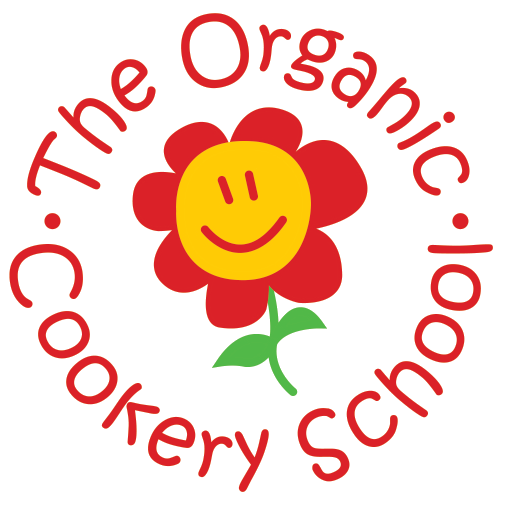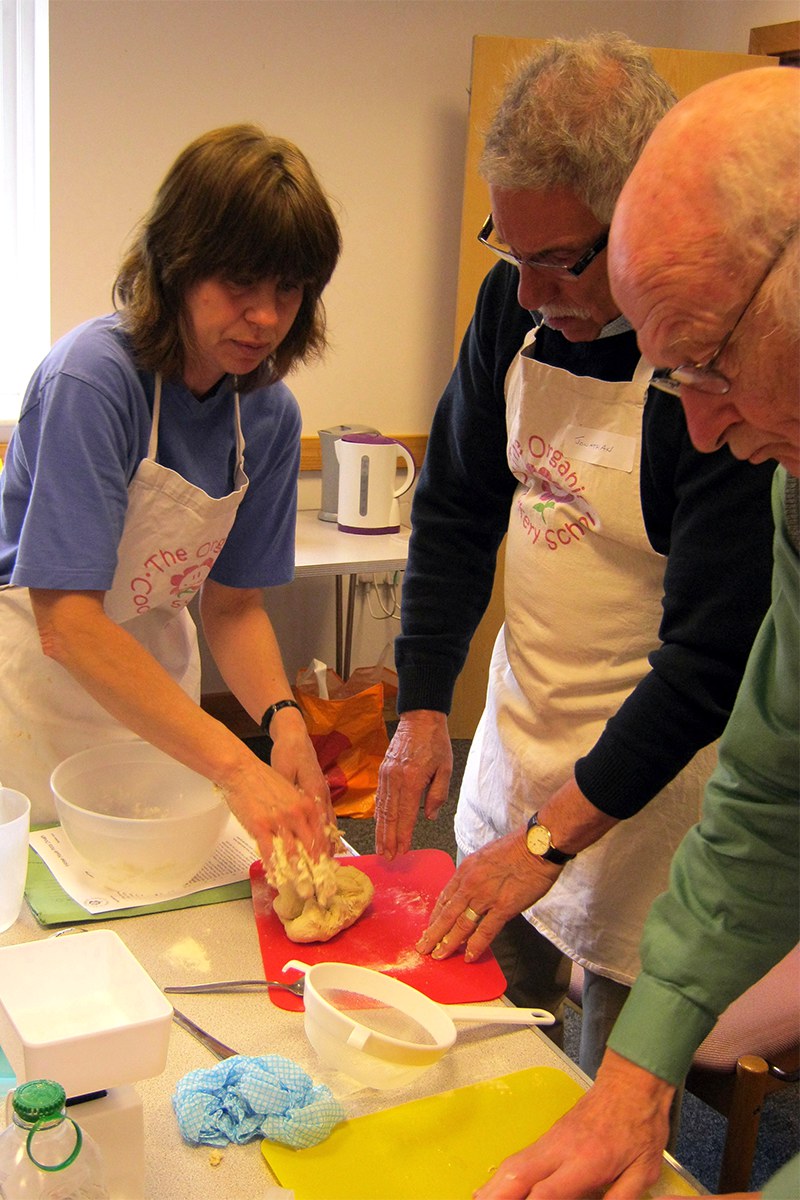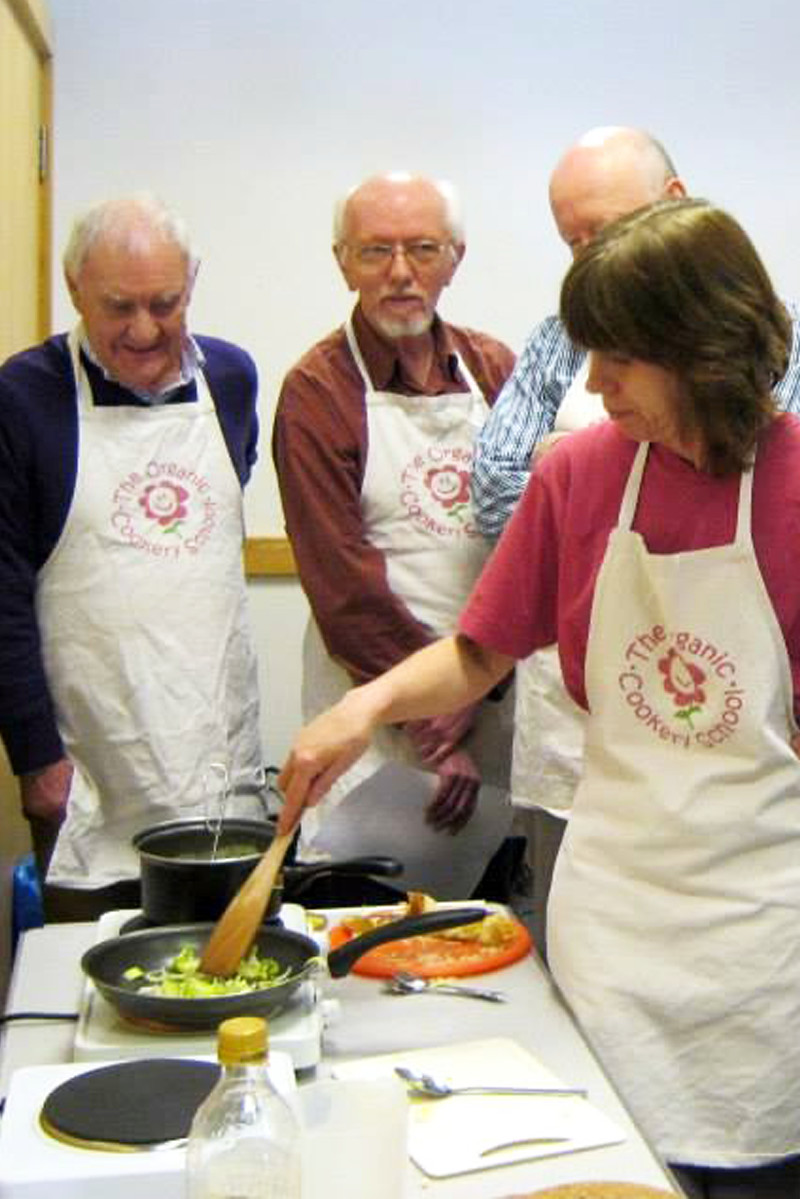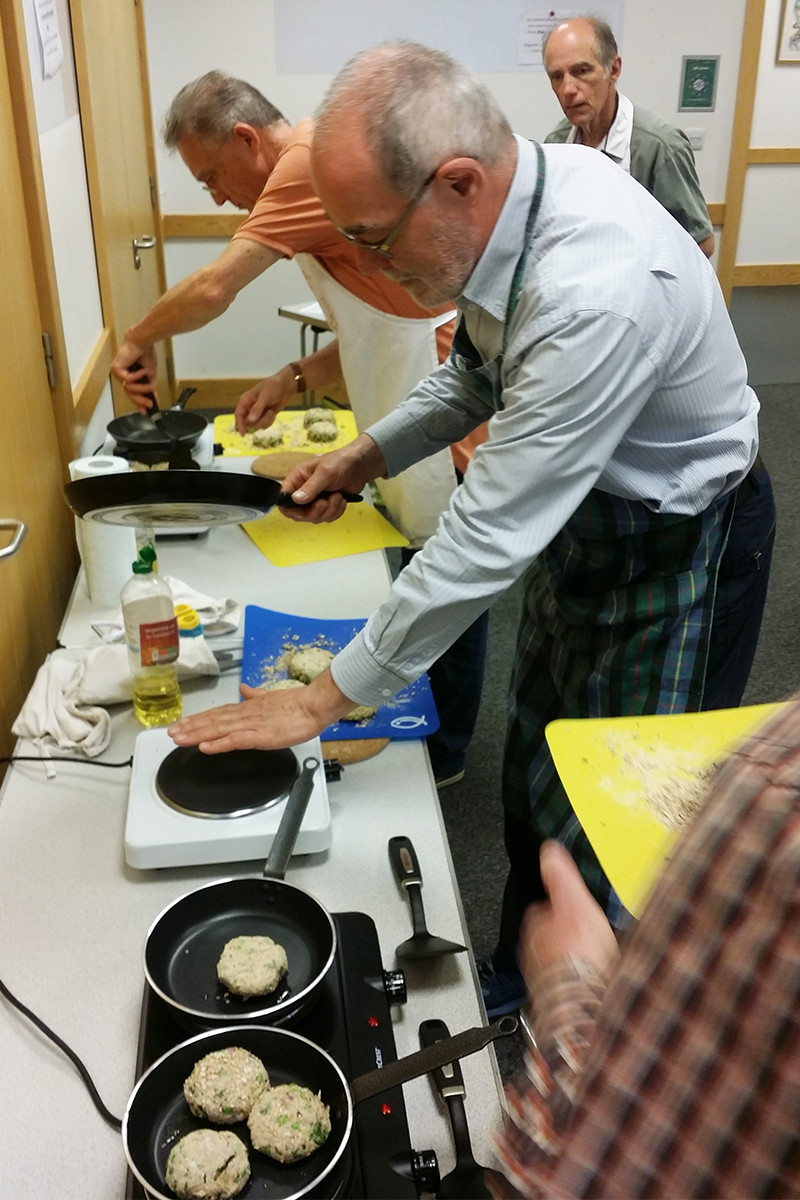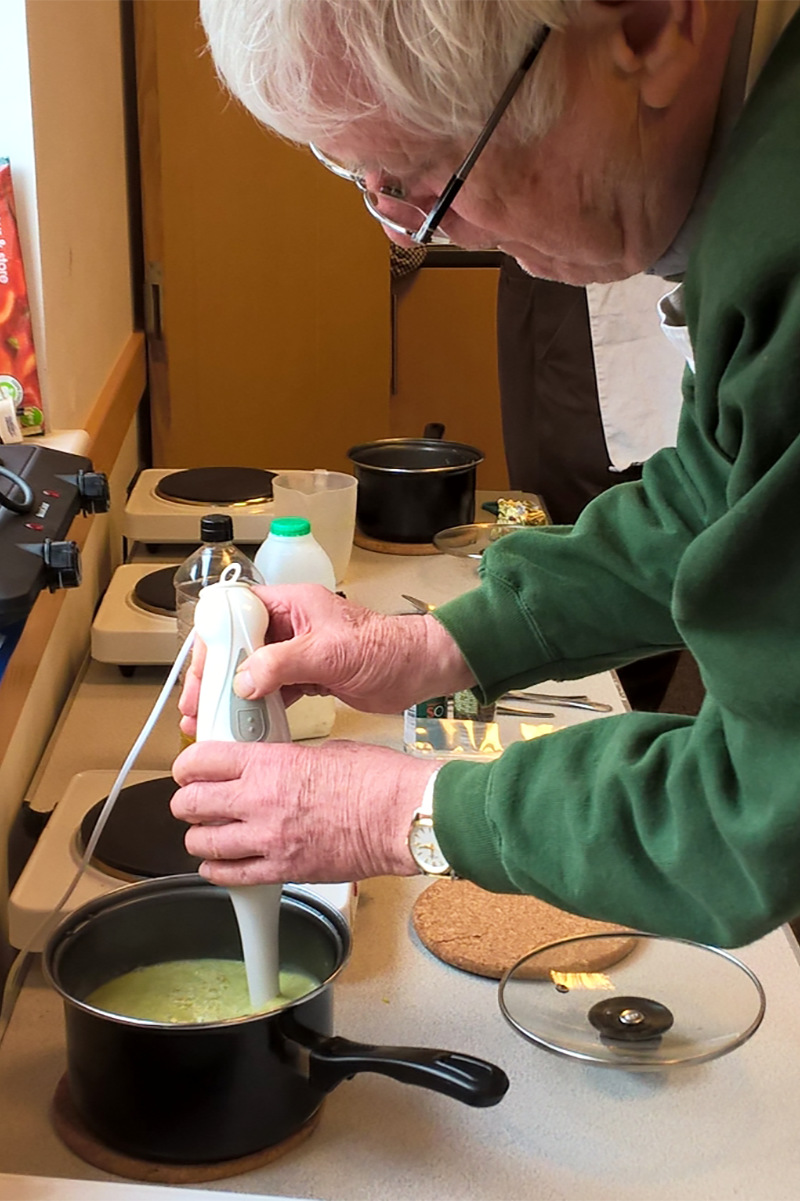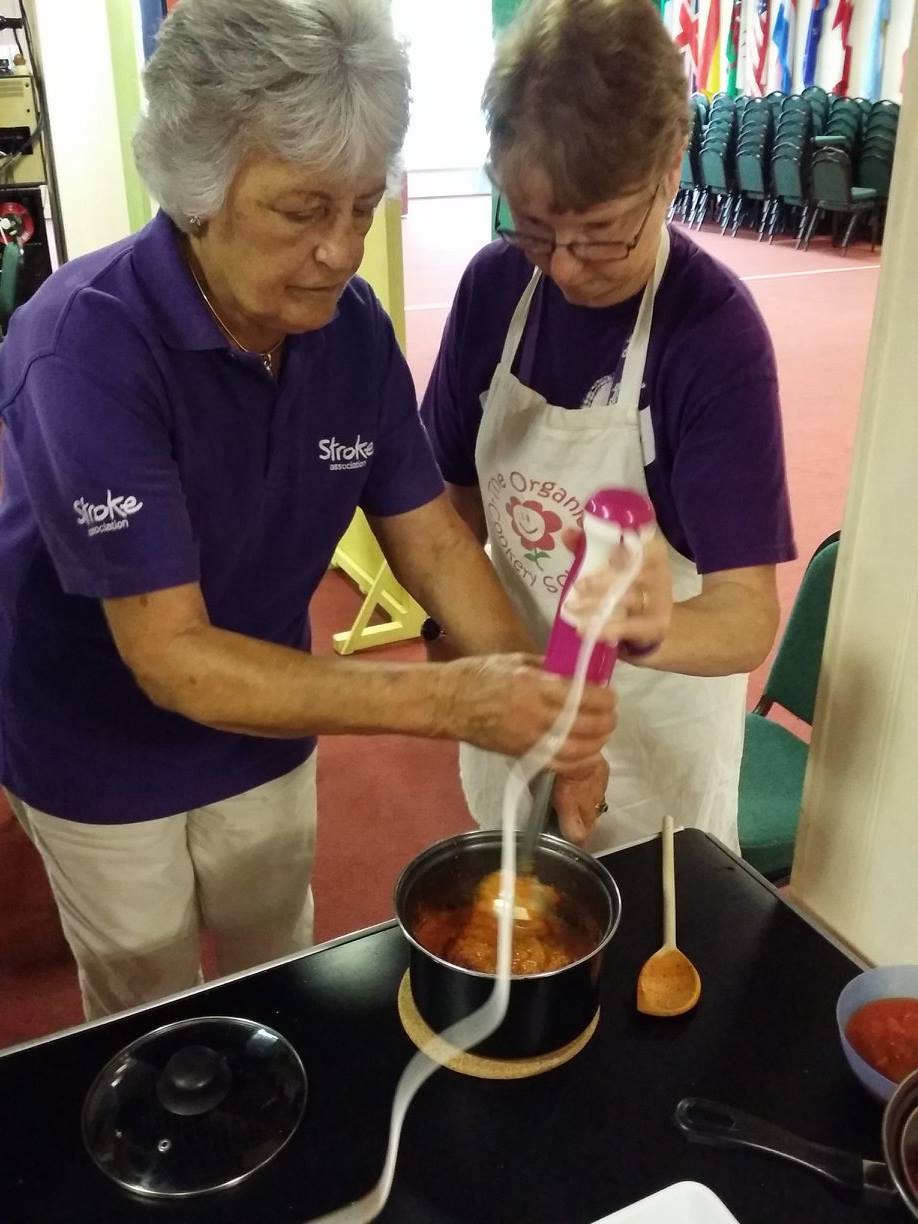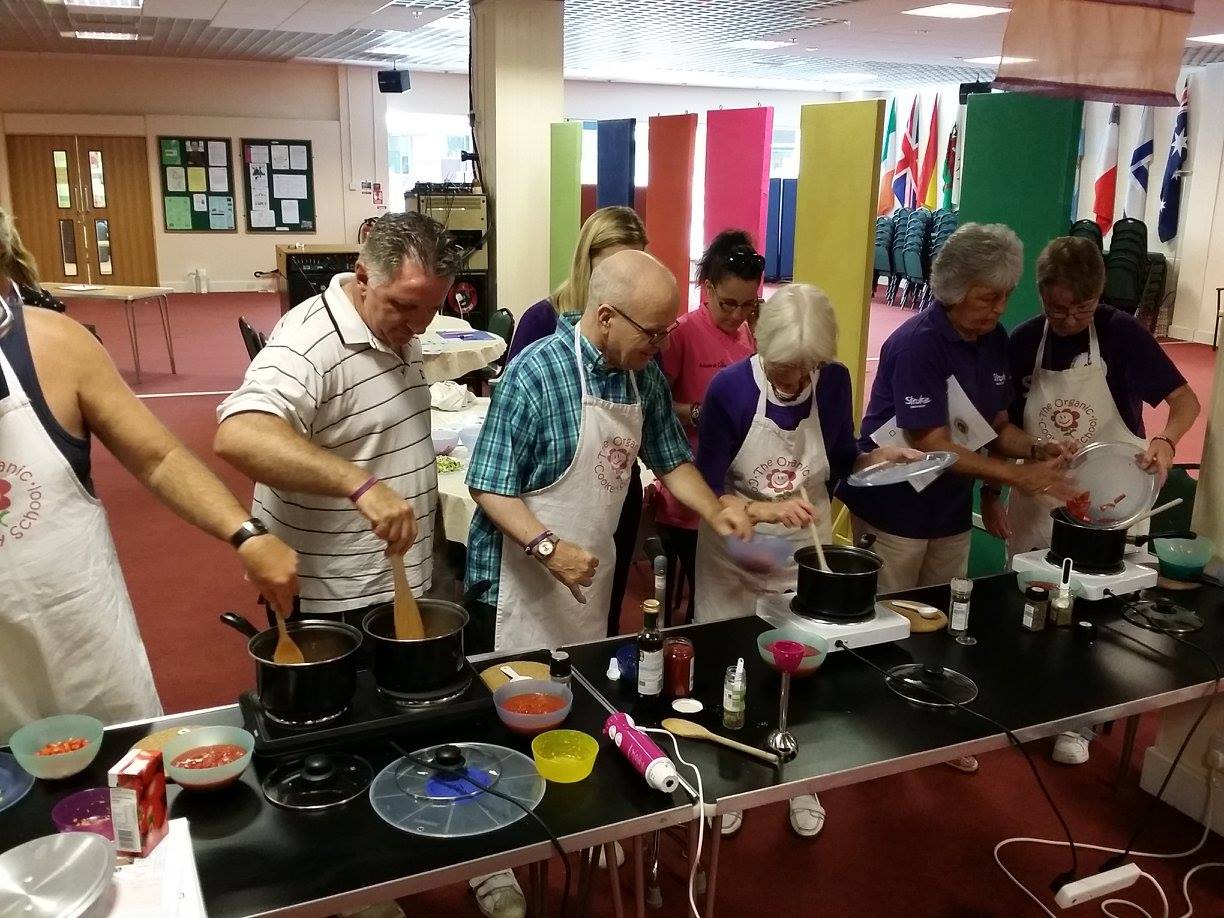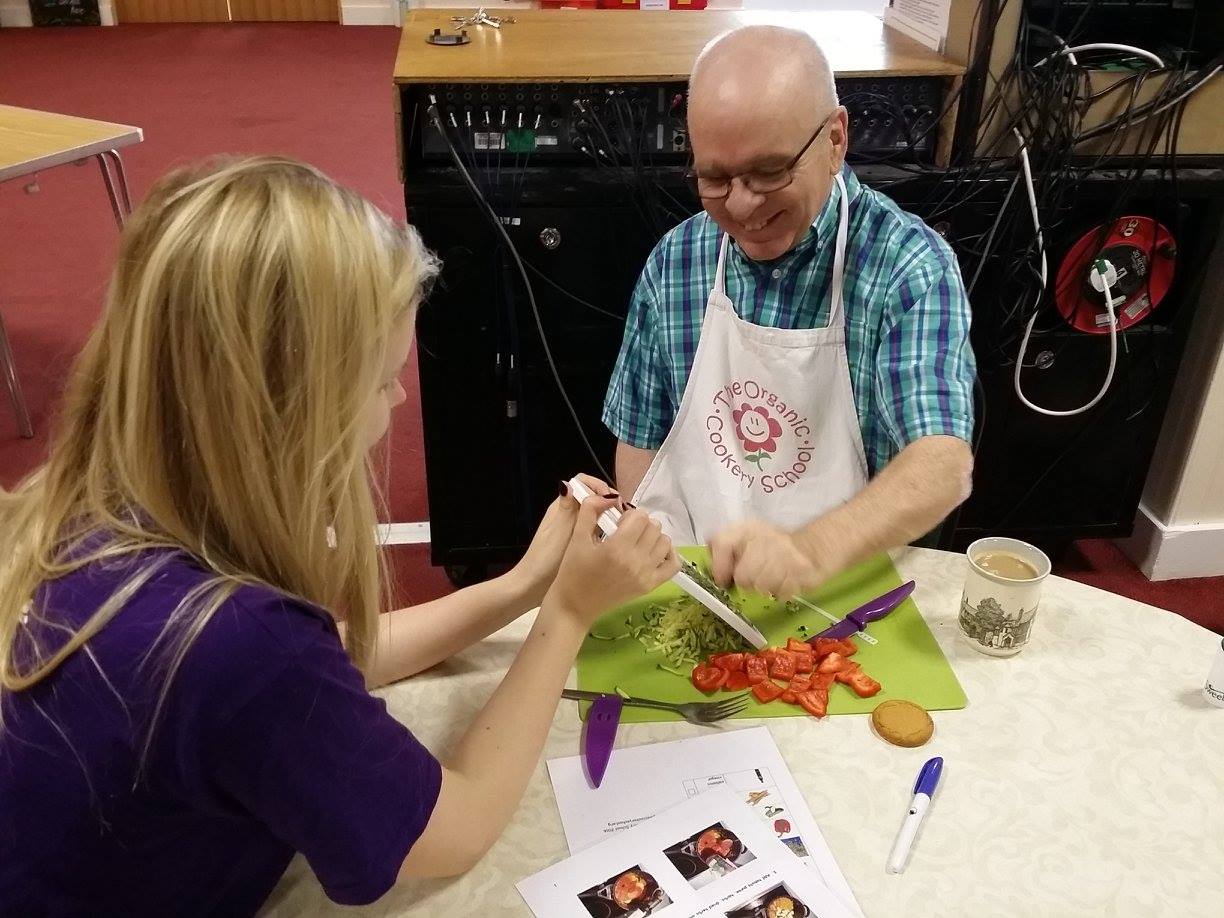MAN WITH A PAN
Man with a Pan is a hands on healthy eating cookery programme for men over 50, which to date has reached over 300 participants living in and around Farnborough, Guildford, Cranleigh, Reigate and Egham.
It was first piloted in 2014, thanks to a grant from Awards for All in response to needs identified by Age UK Surrey. The pilot project specifically targeted vulnerable or isolated older men who may live alone or care for someone; and included an accredited training element for volunteers and partner organisations. The practical cookery course focuses on basic cookery skills, healthy eating, cooking on a budget, and preparing nutritional meals that target health issues of over 50s. Following this program, we have received numerous requests to expand the provision across Surrey, Hampshire and West Sussex. We are currently actively seeking continuation funding for what has proved to be a real life line for male members of our ageing population.
“The Organic Cookery School were great to work and they delivered some fantastic wartime cookery workshops for us. The tutors are brilliant and the families who attended said how fantastic the activities were. Working with The Organic Cookery School adds significant value to our offering as we do not have the cooking facilities or resources to provide opportunities for families to cook at the museum. The activities helped us to engage with Dads and children which is one of our target audiences and to bring new audiences to the museum. The expertise and activities that you provide are fantastic and it’s been great working with you.”
“It has been really helpful to learn the theory behind salt intake and how to avoid too much. I have enjoyed meeting other members of the group and increasing my ideas for meals that I can cook.”
“It has been great to learn so many new cooking skills, this week I have made several recipes at home. Cottage pie cakes, risotto and leak and potato soup.”
“Everything I have learnt has been an enormous boost to my confidence - thank you! The confidence it gives me to try other dishes based on what I have learnt in the class.”
“I have learnt lots of new practical cookery skills, making pizza dough, baking and making scones, making soup and meatballs. I learnt about food safety, food labelling and about the correct amount of sugar and salt to use/eat. The course has been informative and well organised. All the staff and participants were very friendly and helpful.”
“It has been great to watch the practical demonstrations and then having the chance to do it ourselves. I have learnt so many new cooking skills and made new social connections.”
“I found it very interesting learning about the contents of our food and how much salt and sugar are in them and how this is not good to have too much sugar and salt. The tips for a low salt diet were useful. I also learnt that our diet should contain 5 portions of fruit or vegetables.”
STROKE ASSOCIATION
In July 2016, we piloted our first bespoke cookery course for the Moving Forward group, which is made up of stroke survivors of working age.
We were supported by the Stroke Association in South East Hampshire and are very grateful for their communication training and recruitment of volunteers to support the practical cookery activities.
The aims of the project were to:
- Increase confidence in preparing healthy meals for themselves
- Learn ways to adapt recipes/cooking techniques to the challenge of right/left side weakness
- Provide opportunities for communication and confidence building through a shared social activity
- Develop a bank of recipes and resources which are tailored to the needs of stroke survivors and can be used by other voluntary groups.
The group wanted to re-learn cookery skills to regain independence in the kitchen, and had varied needs and levels of confidence.
Here’s a snapshot of a few of the participants:
Profile A
Female stroke survivor aged 28 with a baby, moderate expressive aphasia and right side weakness. Moving into her own home with her husband after living with her parents for 18 months post hospital discharge. She needed to gain confidence in her ability to cook for her family and regain independence.
Profile B
Male stroke survivor aged 45. Married with two young children. Low self-esteem and lack of self-confidence. Wanted to feel more able to help his wife and cook with his children as a result of the course.
Profile C
Male stroke survivor 8 months post stroke, age 50. Has severe expressive aphasia and some right side weakness though mobility improved in recent months. Has four children and used to do a lot of the cooking in the home. Attended with his wife to have an opportunity to communicate with other stroke survivors and regain skills. During the course, he was able to demonstrate his competence and regain some self-esteem. As it was school holiday time, his children also attended on some occasions and were able to see how well their father was doing. Able to explore tasks he could safely carry out at home in the controlled environment of the course.
Profile D
Female stroke survivor 10 years post stroke, age 55. Has moderate expressive aphasia and lives at home with her husband – two grown up children live nearby. Attended as a volunteer and on occasion joined in with tasks if a work station was vacant. Competent at home and manages most tasks independently. Was able to show others how she has adapted some cooking methods to manage her right side weakness. Felt very confident in the group and helped others to do tasks on their own.
Profile E
Female stroke survivor age 49, 2.5.years post stroke. Moderate expressive aphasia and right side weakness in her arm. Lives at home with her husband and two teenage children. Works in the family business, a children’s nursery, and now plans and prepares the children’s meals every day.
What was the outcome?
This was a wonderful project to deliver and received with such enthusiasm by our partners at The Stroke Association and the participants. Over six weeks, we were able to move everyone one on, both in terms of their confidence and relearnt practical cookery skills. Everyone wants to return for more sessions and many are spending more time in their kitchens preparing fresh, healthy food independently.
What have we learnt?
We were very lucky to have been supported by volunteers during the course – many stroke survivors themselves who were further along in their recovery journey. These are essential to any similar project, not only in terms of practical support, but also as an inspiration for participants who could see just how much independence they could regain over time.
We plan the course content to include sitting and eating together – which was so valuable for communication. Don’t miss this out if you’re planning something similar!
We pitched the recipes just right – lots of delicious easy savoury dishes and some healthy sweet treat thrown in. Spicy salmon fishcakes and frozen berry fool anyone?
What’s next?
We are currently applying for continuation funding and hope to expand the roll out this project in 2017 to many more voluntary groups that support stroke survivors. This will include video recipes, a toolkit for voluntary groups and hands on classes in the community.
What can I do to support this project?
You can make a donation to The Stroke Association or buy a copy of the recipes we used for the project, adapted with pictures and simple photographic steps. The recipe book will be available soon, and all proceeds will go towards the development of further course activities for stroke survivors.
